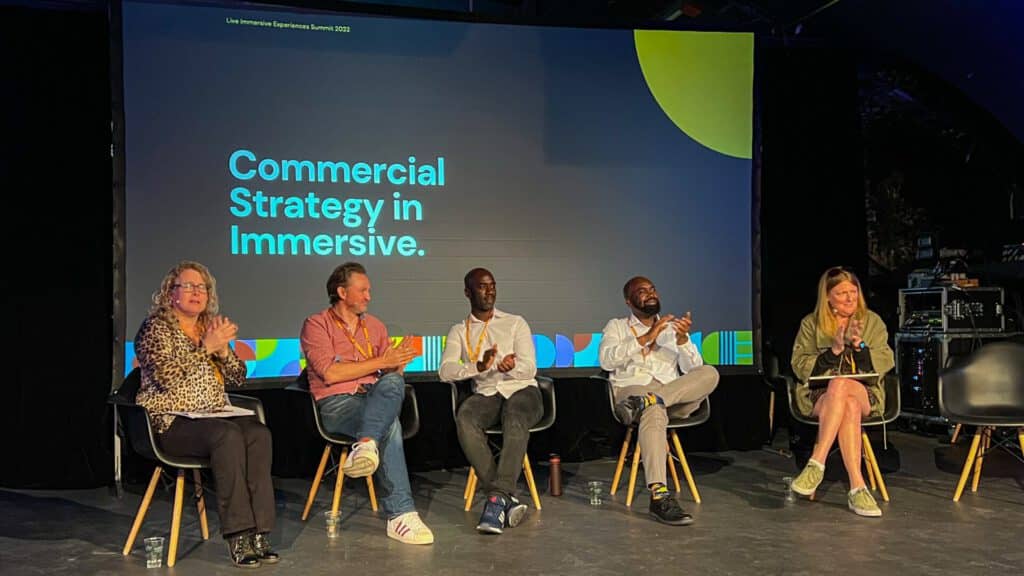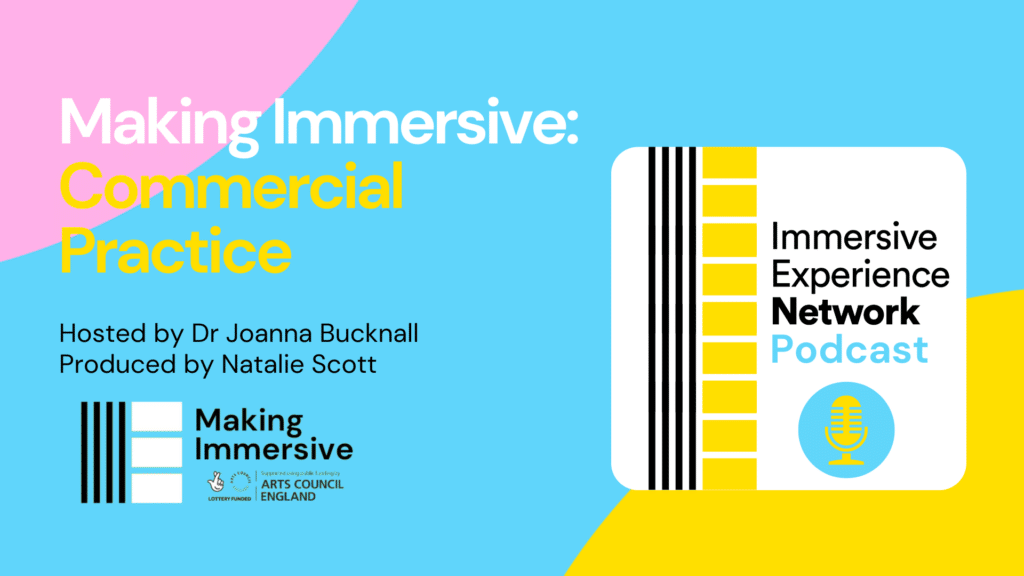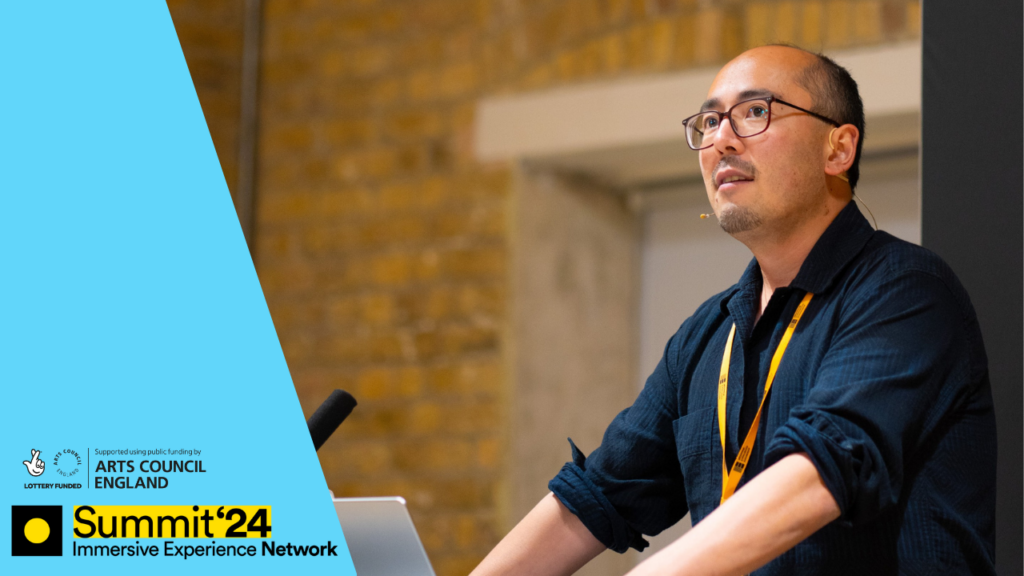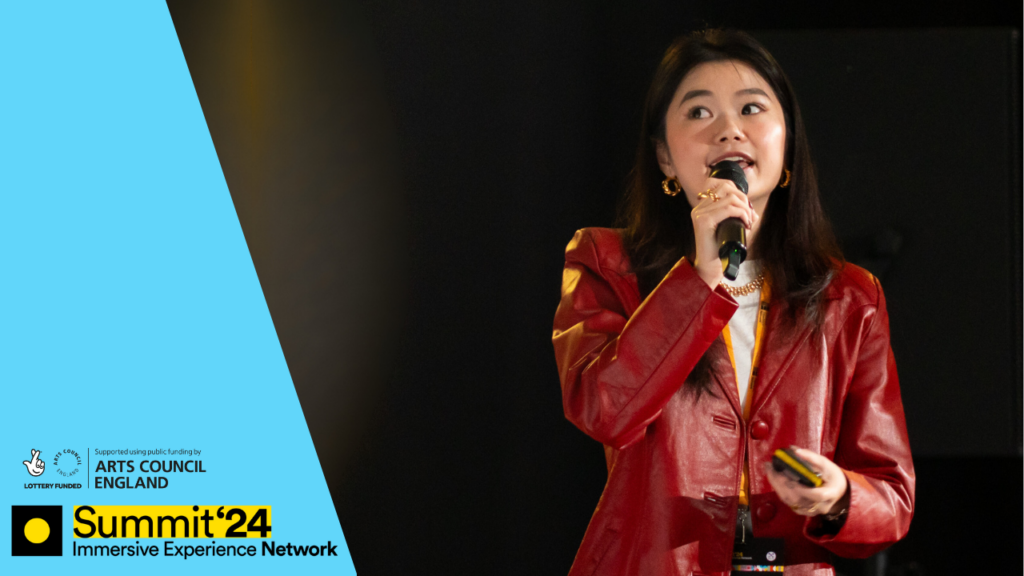Kicking off the day were panellists from a variety of backgrounds – from immersive theatre companies, to marketing agencies to creative incubators – who chewed over questions from the crowd about how to make immersive projects a commercial success.
“We have realised a lot of people are not comfortable talking about money, especially big numbers,” said Farouk Deen of Nexus in the first discussion of the inaugural Live Experience Summit. The talk focused on commercial strategy in the immersive sector – and invited attendees to open up about money, while discussing how to make a profit in an emerging industry that has battled a difficult few years due to the pandemic.
Speakers included James Seager, from Olivier-nominated theatre company Les Enfants Terribles, Meritaten Mance, the founder of PR firm Mance Communications who specialise in representing immersive concepts such as The Crystal Maze and soon-to-be-launched Phantom Peak, and Farouk Deen and Mark Sarfo-Kantanka – the pair behind creative incubator Nexus.
The session was moderated by Helen Kennedy, professor of Creative and Cultural Industries at Nottingham University.
After introductions, the session began with an audience question about how to produce an authentic, but still profitable immersive experience. James Seager said authenticity was as important to his firm as making money – adding that if he is offered a lucrative job, he will not sacrifice his company’s ethos and essence for cash.
“We’re a theatre company,” he said. “What we do is put theatre and story first – that’s our remit. So if a brand wants to launch an event, I say I’m going to create a piece of theatre with a beginning, a middle and an end and a story because that for me is quite important.”
Meanwhile, the Nexus team highlighted how – despite appearances – blockbuster shows don’t always make money and actually breaking even is often deemed a success.
“Big doesn’t always mean they’re making money,” said Farouk. “It depends on what the model is. So if you’ve got a VC [venture capitalist] behind you, for example, or if you’ve got an investor behind you, then their measure of success might not be about profit generation. If you’re generating cash, which means that you’re sustainable for a certain period of time, you can meet your debt obligations or your overheads. That’s all they might need to see.”
He continued: “They’re looking at how they can take what you’re doing, and scale it elsewhere. […] Profit isn’t necessarily a measure for success. So I think we’ve probably seen some of the biggest immersive companies out there, not making money. And yet people still enjoy their shows [and they are now] expanding overseas. [It depends] how the investor is looking at success.”
He also encouraged those in the audience wanting to start and fund their own show or company to take inspiration from other sectors.
“Don’t be put off by looking at good practice from other industries and other sectors as to how they’ve gone about it. Don’t necessarily look within our own industry for guidance. There’s things that you could take and copy and paste and use as a strategy for yourself. [Ask yourself] Is there anything that we can learn from observing that?”
The conversation soon moved on to talking about IP – or intellectual property – shows versus wholly original pieces of immersive. IP shows are those based on an established format such as the Crystal Maze or Les Enfants Terribles’ production of Alice in Wonderland. The discussion focused on the pros and cons of an IP show – and how on one hand they can help generate early interest from consumers as guests are buying into a proven concept, but on the other hand can be more restrictive and harder to execute.
Meri Mance said: “I think sometimes IPs can be quite restrictive. For the things that we’ve worked on, there’s only so far you can go with [them]. With IP-led experiences, that’s kind of an easy route, if I’m being honest. [On the other hand] those really, really beautiful stories consumers do buy into, I really believe that. I’d love to see more of that. And we do really encourage people to, to go into that – it’s possible.”
James Seager said he believed success was less about buying into a known story, but more about whether content resonated with audiences. “I suppose, you’ve got to choose things that resonate with the audience or have a hook. Ironically, the only immersive show that we’ve completely sold out is a show that’s not based on an IP.”
He later added: “So I think you just have to ask the question, which sounds like an obvious question. But why? Why would you want to go and see this show? Why should this show be an immersive show? I think that’s an important question. And why? Why would I part with my money to go and see this?”
On the same topic, another audience member asked whether the panel thought consumers book a show because of its concept or content, or because they are interested in experiencing immersive shows.
Meri Mance had a positive outlook on the popularity of the immersive sector.
“There is an appetite for immersive, to the point where I feel like there needs to be a cultural section in every publication that is just about immersive. Because in my experience, of all consumers and publications, it’s there in a very real way. That is both IP [shows] and completely creative [shows].”
“Phew!” Professor Kennedy joked – summarising the mood of the audience.
After a brief discussion about how COVID had impacted the creative industries, and the immersive sector in particular – “The past two years wasn’t great. The creative industries were just shafted, really left to one side,” the Nexus team remarked – the discussion turned again to take a positive look at the future of Immersive.
James Seager said London was a world-leader of producing immersive projects – adding he’d experienced a huge global appetite for the city’s creativity.
He said: “I think, first of all, there’s a demand outside of London, which is huge. I mean, pre-pandemic, and let’s see, and I hope [now] things improve. But I believe London is leading the way in immersive theatre or immersive experiences worldwide. When we took our show to Shanghai, we were kind of inundated with approaches because of the demand over in Shanghai, and the Chinese market, really wanting immersive shows. I see that in America as well.”





